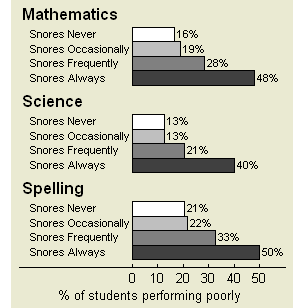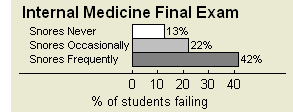


|
Order AcuSleep for your child |

 Snoring and Learning Problems
Snoring and Learning Problems
Main Points
Severe snoring is a curable cause of learning difficulties in children. Without prompt treatment, these difficulties may become permanent. Severe snoring is, however, surprisingly difficult to recognize -- which is why the AcuSleep test can change lives.Links between Learning Difficulties and Snoring
It's common knowledge that even one night of poor sleep makes learning harder. Children with severe snoring may have poor sleep every night. One expert states:Snoring vs. Sleep ApneaEven the absence of discernable daytime symptoms does not rule out a pathologic condition associated with snoring. The snoring "C student" may have been an "A student" were it not for subtle sleep disruption associated with "apparently" benign snoring.That is, even when a child appears healthy and behaves completely normally, it is still possible the child's school performance is being impaired by sleep problems. Snoring's impact on school performance may be permanent (see below). Experts now speak of "irreversible learning deficits" attributable to poor sleep. This adds some urgency to addressing pediatric sleep problems.
Snoring may be a sign that sleep apnea is present. But recent studies (see below) have linked poor school performance and isolated snoring. This is a very important discovery. In other words, children who snore have more learning problems even when the children test negative for sleep apnea. Doctors routinely treat children who have sleep apnea, but until recently there has been no suggestion that snoring, by itself, deserves treatment. Because of these recent studies, however, experts now believe existing guidelines for the treatment of children with isolated snoring need re-examination. Bottom line: Testing children only for sleep apnea may miss some cases of poor school performance caused by severe snoring.Results of Selected Pediatric Studies
- Children with snoring and restless sleep have IQ scores 13 points lower than non-snorers without restless sleep.
- A study in Kentucky examined the snoring history of 1588 children aged 13-14. About half were poor performers in school, and about half were high performers. None of the children currently snored. The study found that the children in the poor-performing group were significantly more likely to have snored loudly and frequently at ages 2-6 than children in the high-performing group. The researchers conducting the study concluded: "Young children who snore loudly and frequently during their sleep are at higher risk for exhibiting lower grades in school several years after the snoring has resolved." This study has prompted concerns that learning deficits attributable to sleep breathing problems may be irreversible if they occur during critical times of life.
-
 A 2003 study
of 1090 German third-graders showed a link between snoring and poor academic performance in three different school subjects.
The researchers divided children into groups, according to how much each child snored.
Within each group, they counted how many children were performing poorly in each subject.
("Poor performance" corresponded approximately to the bottom 20% of students.)
As the figure shows, in three of the school subjects, more severe snoring was linked to a higher chance of performing poorly.
For example, 16% of non-snoring students performed poorly in mathematics, but 48% of the most severely snoring children performed poorly.
Snoring was related to poor performance in science and spelling, as well as mathematics.
Snoring was not related in this study to performance in handwriting or reading.
A 2003 study
of 1090 German third-graders showed a link between snoring and poor academic performance in three different school subjects.
The researchers divided children into groups, according to how much each child snored.
Within each group, they counted how many children were performing poorly in each subject.
("Poor performance" corresponded approximately to the bottom 20% of students.)
As the figure shows, in three of the school subjects, more severe snoring was linked to a higher chance of performing poorly.
For example, 16% of non-snoring students performed poorly in mathematics, but 48% of the most severely snoring children performed poorly.
Snoring was related to poor performance in science and spelling, as well as mathematics.
Snoring was not related in this study to performance in handwriting or reading.
-
 Snoring's harmful effects can extend into adolescence and young adulthood.
A 1998
study
showed that medical students who snore are more likely to fail examinations.
As the figure shows, 42% of students who described themselves as frequent snorers failed
their final examination in internal medicine, compared to only 13% of non-snorers. Occasional snorers were in-between.
Thus, failure was more likely in this study the more one snored.
Snoring's harmful effects can extend into adolescence and young adulthood.
A 1998
study
showed that medical students who snore are more likely to fail examinations.
As the figure shows, 42% of students who described themselves as frequent snorers failed
their final examination in internal medicine, compared to only 13% of non-snorers. Occasional snorers were in-between.
Thus, failure was more likely in this study the more one snored.
-
Technical summary:
"There is now a growing awareness that sleep may play an important role in learning, by affecting the consolidation and integration of memory, with slow-wave sleep facilitating the assimilation of new knowledge, while REM sleep facilitates the accommodation of new memories."
- "An assessment of sleep patterns and possible sleep problems should be part of the evaluation of every child presenting with behavioral and/or academic problems, especially Attention Deficit/Hyperactivity Disorder (ADHD)."
- "All children should be screened for snoring." -- American Academy of Pediatrics, 2002.
It is important to measure snoring, in order to distinguish mild snoring from severe snoring. Mild cases of snoring are less likely to cause hyperactivity. Pediatric sleep experts warn that measuring snoring is challenging. Just listening to the child is not enough. Snoring comes and goes during the night. It may be present only in the middle of the night -- when parents are not awake to listen. Some parents over-estimate their child's snoring, and some under-estimate.
 The AcuSleep Test
The AcuSleep Test
The AcuSleep test measures how much your child snores, and whether body position influences snoring. It is the only validated, in-home snoring measurement test available without a prescription. It is for children ages 4 and up, and has many advantages over other methods of snoring measurement. The AcuSleep test is easy for you and fun for your child. The results are sent to you in a clear, easy-to-read report and CD-ROM. An additional copy can be sent to your pediatrician.Benefits of the AcuSleep Test
It is very difficult for a pediatrician to determine whether a child has mild or severe snoring. As a result, too many pediatricians -- even good ones -- do not fully consider that simple sleep problems may cause major daytime problems in children.Summary
The effects of severe snoring on children are so profound that the American Academy of Pediatrics recommends all children be formally screened for snoring. Don't wait. Don't let your child fall farther behind each night, or take unnecessary medication. Order the AcuSleep test for your child today. For more information, see:
References

 Nothing herein should be construed as medical advice. Terms and Conditions. Privacy.
Nothing herein should be construed as medical advice. Terms and Conditions. Privacy.
Copyright (C) 2002-2005 by Apneos Corporation. All Rights Reserved. Patents pending.
v.DJF-I